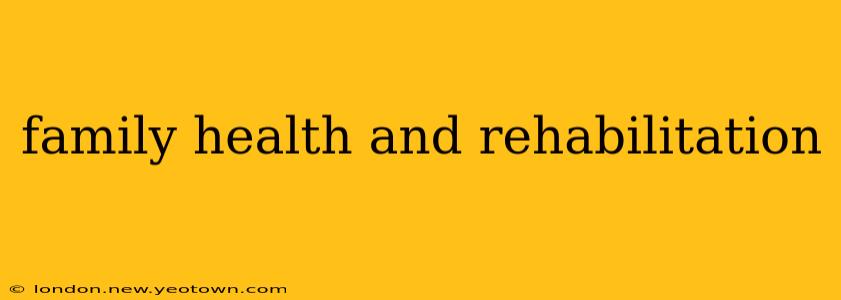Family health and rehabilitation is more than just individual care; it's a holistic approach that recognizes the interconnectedness of family members and their impact on each other's health and wellbeing. It's about creating a supportive environment where everyone thrives, not just individually, but as a unit. This journey often starts with identifying needs and challenges within the family dynamic, and then creating strategies to foster growth and resilience. Think of it as building a strong, healthy tree – you need to nurture the roots, the trunk, and every branch to ensure its overall strength and longevity.
What is Family-Centered Rehabilitation?
Family-centered rehabilitation focuses on empowering families to actively participate in the recovery and rehabilitation process of a family member. This isn't just about providing physical or occupational therapy; it's about understanding the family's unique strengths, challenges, and goals. Imagine a family dealing with a child's injury – family-centered rehab would involve the child, parents, siblings, and even extended family members in developing a customized plan. This might involve learning adapted techniques for daily tasks, managing emotional stress, or adjusting family routines to support the child's recovery.
How Does Family Health Impact Rehabilitation Outcomes?
A strong, supportive family dynamic can significantly impact the success of rehabilitation efforts. When family members understand and support each other, they are more likely to adhere to treatment plans, provide encouragement, and create a positive environment for healing. Conversely, family conflict or lack of support can hinder recovery and lead to setbacks. This underscores the critical importance of addressing the entire family's needs, not just the individual's who is undergoing rehabilitation.
What are Some Common Challenges Families Face During Rehabilitation?
Navigating the challenges of family health and rehabilitation is rarely straightforward. Many families struggle with a multitude of issues, including:
Financial Strain: Medical expenses, lost wages, and the need for specialized equipment can create significant financial burdens. This often leads to stress and anxiety, potentially hindering the recovery process.
Emotional Toll: Dealing with illness or injury can be emotionally taxing for everyone involved. Guilt, fear, anxiety, and depression are common emotions experienced by family members.
Role Changes and Responsibilities: Illness or injury often necessitates significant adjustments to family roles and responsibilities. This can lead to conflict and resentment if not managed effectively.
Communication Breakdown: Stress and exhaustion can lead to communication breakdowns, creating further challenges for the family. Open and honest communication is vital for successful rehabilitation.
What Resources are Available for Families?
Thankfully, many resources exist to support families navigating health and rehabilitation challenges. These include:
Support Groups: Connecting with other families facing similar challenges provides invaluable emotional support and practical advice.
Therapists and Counselors: Family therapy can help address communication issues, manage conflict, and provide coping strategies for stress.
Respite Care: Respite care provides temporary relief for caregivers, allowing them time to recharge and prevent burnout.
Government Assistance Programs: Many government programs provide financial assistance for medical expenses and other related costs.
How Can Families Improve Communication During Rehabilitation?
Effective communication is the cornerstone of successful family health and rehabilitation. Families should strive to:
- Create a safe space for open and honest communication: Encourage family members to express their feelings and concerns without fear of judgment.
- Practice active listening: Pay close attention to what others are saying and try to understand their perspective.
- Establish clear expectations and roles: Define responsibilities clearly to avoid confusion and conflict.
- Seek professional help when needed: Don't hesitate to seek the help of a therapist or counselor if communication becomes strained.
Family health and rehabilitation is a journey, not a destination. It requires patience, understanding, and a commitment to working together as a team. By focusing on the holistic wellbeing of the entire family, we can create a supportive environment that fosters healing, resilience, and ultimately, a happier, healthier future for everyone involved.

